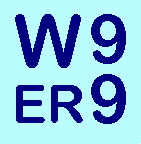
 |
II (Ibero-American) Workshop on Requirements Engineering |
| Buenos Aires, Argentina
9-10 September, 1999 |
| List of Accepted Papers
Requirements Negotiation and Elicitation (click on the title to retrieve a paper) |
| Baseline
Mentor. An application that derives CRC cards from lexicon and scenarios
Leandro Antonelli, Gustavo Rossi and Alejandro Oliveros |
| Abstract. This paper introduces a tool to help domain expert during requirements engineering phase in software development. This proposal is framed by Leite’s work on a client oriented requirements baseline (Leite 1995), which aims to model the external requirements of a software system and their evolution within it. A requirements baseline is a structure which incorporates descriptions about a desired system in a given macrosystem. The baseline is composed of five views: the lexicon model view, the basic model view, the scenario model view, the hypertext view and the configuration view (Leite 1997b). This article will not deal with basic model view; it will treat with the other four views. The baseline is extended with a strategy to derive object oriented specifications (Leite 1997). The application introduced, called baseline mentor, handles with projects. Each project contains several versions. Versions are composed of lexicon, scenarios and CRC cards. Baseline mentor allows editing and navigating through this information, making integrity and consistency checks, deriving automatically CRC cards from lexicon and scenarios, and exporting information in HTML tags, and RTF format. |
| A
requirements elicitation approach based in templates and patterns
A. Durán Toro, B. Bernárdez Jiménez, A. Ruiz Cortés and M. Toro Bonilla |
| Abstract. Not available. |
| Activity
Theory: a framework to software requirements elicitation
Luiz Eduardo Galvão Martins and Beatriz Mascia Daltrini |
| Abstract. In this article we defend the idea that social aspects have strong influence in the software requirements elicitation (Goguen 1993), which drive us to find help in the social sciences. The Activity Theory is a theory developed in the Psychology that focuses the human practices of development process, both the individual and social levels. This theory states that any human action must be understood within a minimal social context, established by an activity. So, we have proposed an approach of software requirements elicitation that have as framework several precepts from the Activity Theory. The case study is developed to show the possibility of using some principles of the Activity Theory in the software requirements elicitation. |
| Elicit@99
um protótipo de ferramenta para a elicitação de
requisitos
Néstor Adolfo Mamani Macedo e Julio Cesar Sampaio do Prado Leite |
| Resumo. No presente trabalho apresenta-se o editor de requisitos Elicit@99, um protótipo de ferramenta para a elicitação de requisitos. Este protótipo está baseado no modelo Serbac-m, o qual é parte do “Requirements Baseline”. Elicit@99 implementa duas estratégias para a elicitação de requisitos: o uso do acesso estruturado ou enlace hipertextual, que víncula o editor de requisitos ao modelo de negócio, para a captura tanto dos Requisitos Funcionais (RFs) como dos Requisitos Não Funcionais (RNFs), e do repositorio de requisitos para a captura exclusiva dos RNFs de Qualidade. |
| A
knowledge acquisition systematic within the domain analysis context
Mônica Zopelari Roseti and Cláudia Maria Lima Werner |
| Abstract. Not available. |
| Complete
List of Papers
Sections Requirements Negotiation and Elicitation Requirements Analysis Requirements modeling and representation Requirements process and management Position papers - multidisciplinary approach and education |
| [WER99] [Call for Papers] [Coordination] [Program Committee] [Workshop Program] |
| [Invited Speakers] [Industrial Track] [Educational Track] [Travel, Hotels and Tourism] |